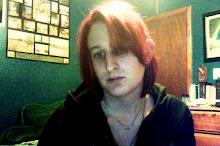
I’m having a lot of trouble articulating my thoughts, and I’m fairly certain this has nothing to do with my writing skills and everything to do with a swell of confusion clouding my thoughts. I started writing late last night...
Smile big. That blissful arcing mouth betrays nothing—a life finally beaming with rapturous felicity. Recently I’ve seen so many pictures of astoundingly beautifully trans women and girls, their faces filled with that radiant ecstasy that only accompanies a feeling of becoming. They take off the mask and, well, they don’t particularly blend into the rest of the world. Unlike much of the world, these amazing women stand out because they are unabashedly authentic. That smile betrays nothing because there are no dirty secrets to hide. Instead that smile conveys a palpable sense of self-belonging: a manifestation of the true self that transcends any physical realities or assumed limitations therein. That smile...it speaks volumes.
“Why don’t you smile?” We’re sitting on the couch, playing picture slide-show with photos from facebook—she’s every friend I’ve ever had, the Fin from orientation, the random faux-hawk- sporting dyke from GLBTA—she leans over my shoulder to get her face right up next to the picture and remarks, “You never smile in your pictures.” And it’s true: I don’t. The absence of facial expression betrays me. My face is a transparent facade, a mask my “transition” could not dislodge.
I am a stranger. To this culture and to myself, I am an outsider. I feel invisible in a crowd, like no one can see me. They see the tattoos. They see the height. They see the awkward body, hidden under the baggy clothes. But they don’t see me. Maybe I cannot blame them, though. Looking in the mirror, I don’t see me either.
I want to be the girl I am in my head—in my imagination—but that seems like an impossible task. What kind of girl are you? How do you relate to yourself as a girl? How do you relate to yourself as a girl in your head—a character constantly pitted against a physical and social manifestation that, seemingly, can never be merged? How do you take off the mask and become this other person?
These questions, for me, first manifested as a feeling of disconnection with femininity. I’m feminine, even though I nothing about my appearance seem to coincide with that. I’m tattooed, I’m tall, and my body has few curves (well, few curves that I’m proud of)—I’m awkward and I’m tough, punky and queer. I remember when I was in high school I used to subscribe to a trans youth email listserve and one day I asked, “How can I begin to feel like a girl when I’m so lodged into a male reality?” The replies came back: shave your legs. So many sources tell us that femininity is something to be bought or manufactured. Feeling too masculine? Well, pluck those eyebrows, shave those legs, and put on a dress from Meyers. Peep-toe pumps, I hear, will really do the trick. Have you tried makeup?
Since when is femininity a commercial commodity? Since when did gender come packaged and mass-produced for consumer consumption?
But it’s more than just commercialized gender. Talking to a telephone counsellor tonight we discussed how many non-transgender women, like me, feel awkward in their bodies compared to other women—how many of them, like me, look out of place in traditional feminine attire and therefore gravitate towards more masculine or androgynous gender expressions. At the end of the conversation, I asked my counsellor, “How do you relate to yourself as a woman?” She paused for a while and said, “I don’t know. I think it’s a bit like an attitude. It’s how I go about in the world, it’s a part of my identity. It’s always been a given.” I think that’s part of it. It’s not a given for me, and so in finding ways of relating to the girl in my imagination, I have nothing to build on. It seems like all the givens—all the assumptions—work against me; I feel like everyone—even I—fails to “read” me—to see me—for who/what I really am.
And that’s it. I feel alienated from my own gender because of an inability to perceive my true self in any clear fashion. I feel further alienated when, in an attempt to find some superficial facet of femininity, I am met with an unattainable commercialized standard of what femininity is—a commercial definition that does not become me. How do you relate to yourself—to your true self—when it becomes progressively difficult to find a clear expression of that self? When you become a stranger to yourself and to others?


